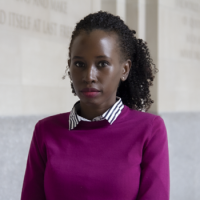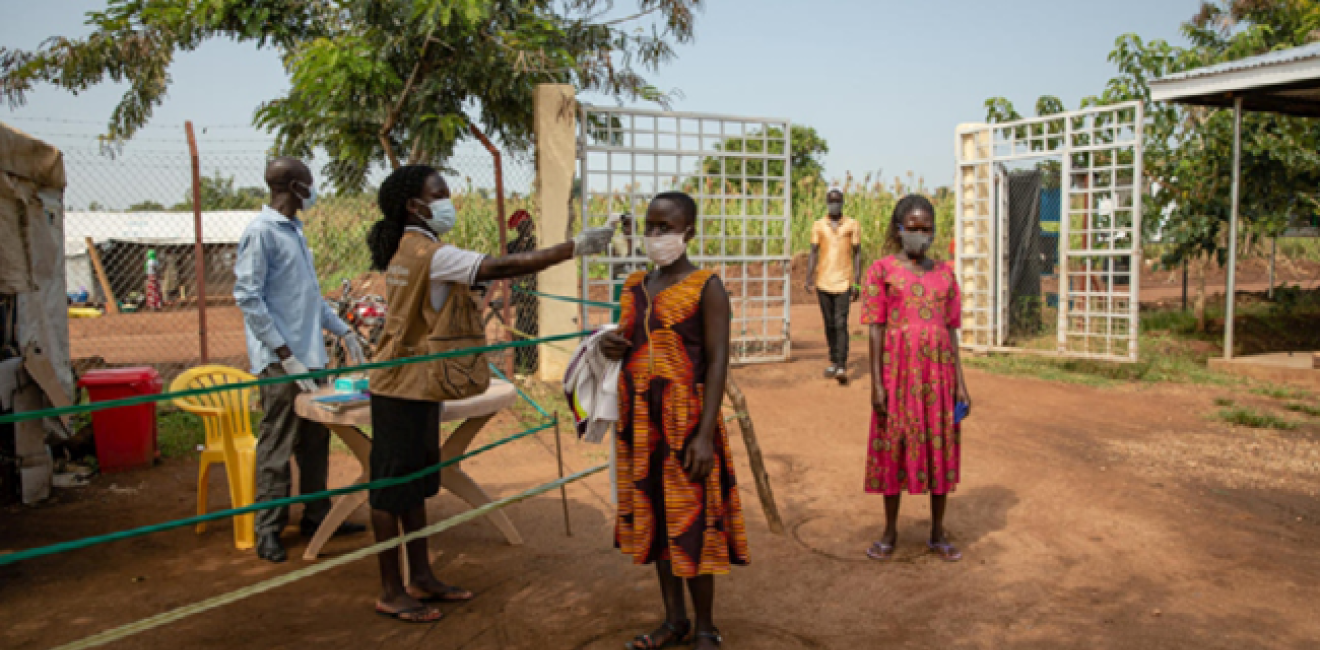
A blog of the Africa Program
Rebecca, a 28-year-old South Sudanese woman living in the Nyumanzi settlement of Uganda's Adjumani district, was at the borehole when she first heard the news of a total lockdown. Home to nearly 1.6 million refugees, Uganda had closed its schools and suspended all gatherings, movement, weekly markets, and non-essential businesses to curb COVID-19 transmission. Like the other women fetching water, Rebecca was afraid of the new virus and how quickly it could spread across the refugee settlement. However, within a few weeks their fears had changed. Rebecca and other refugee women peace mediators, who regularly resolve or refer conflict cases in the community, had received several reports of domestic violence, defilement of out-of-school girls, and family disputes over dwindling food rations during lockdown. Local council leaders and local courts were not able to take or hear cases. Refugee women could not mediate conflicts or follow up on reports of violence as this was not considered an essential service.
For these South Sudanese refugee women, it was critical to mitigate COVID-19's worst effects in their communities. In doing so, they demonstrated their leadership capacity and exemplified the benefit of including women in decision-making on peace and crisis-response.
As COVID-19 cases increased, it became clear that the health crisis also posed a significant threat to women's peace and security. Women were excluded from COVID-19 decision-making even as lockdowns and other containment measures led to greater sexual and gender-based violence. Failure to take into account women's experience resulted in negatively affected livelihoods, economic rights and access to health care for marginalized women.
Since Uganda's first reported case in March 2020, national and sub-national level COVID-19 taskforces were quickly assembled to oversee and implement COVID-19 management guidelines with sub-committees focused on case management, surveillance, security, risk communication, and logistics. However, an early study revealed that the specific needs of women and persons with disabilities were not assessed when planning and implementing COVID-19 activities within 35 district task forces. Subsequent research conducted in five geographic sub-regions also confirmed that women, women with disabilities, and women's rights groups were largely under-represented or excluded from decision-making roles within COVID-19 taskforces and discussions on budget allocations.
For women peacebuilders, it was crucial to ensure the COVID-19 crisis response did not further marginalize conflict-affected women through policies, and practices that endangered women and side-lined their perspectives. Therefore, refugee women peace mediators in West Nile sprung into action to make sure the situation of women and girls in lockdown and the potential risks to their safety were known. During the total lockdown, they used phone calls to communicate the details of cases and kept a common record to ensure women's and girls' concerns were documented and could be addressed. When freer movement was allowed, they reached out to the district leadership to take action. "As peace mediators, we had a meeting and compiled a report with concerns that we presented to the District Peace Committee. Some of our issues were responded to and we plan to continue following up. The district local government also offered us radio talk time to focus on the impact of COVID-19 on women and peaceful coexistence," Farida an avid peacebuilder explained.
By proactively seeking solutions to women and girls' security concerns, South Sudanese refugee women were also able to collaborate with the district leadership in Adjumani to address COVID-19 related challenges.
When the COVID-19 District Task Force needed additional practical support to coordinate efforts to prevent and control the spread of COVID-19, the Adjumani district's local government leaders, counted on the South Sudanese refugee women's leadership. Working with the task force, Rebecca and other refugee women scheduled visits to different boreholes and across their communities to inform people how to protect themselves from COVID-19. When community members were hiding relatives who crossed the border into the refugee settlements without COVID-19 screening, refugee women intervened to convince them to report to quarantine centers.
This same leadership continued when conflict broke out between Nuer and Dinka youth in Maaji II refugee settlement in May 2020 during the lockdown. "A small disagreement between five youth escalated into a violent tribal conflict with two dead. We called the refugee settlement commandant and asked him to urgently call the police. We kept the children from the two families in a safe place because they were being attacked for having started the fights," narrated Janet who witnessed the event unfold. In the days that followed, the women peace mediators co-hosted a mediation dialogue including district leaders, representatives of the Office of the Prime Minister, UNHCR, and civil society, as well as religious, cultural and political leaders. Since then, members from both ethnic groups are interacting with each other on a daily basis and have resumed friendly football matches. Women mediators requested for additional security lights and as a result, youth prone to violence are no longer gathering in dark spots to attack women and girls.
While the COVID-19 context presented new challenges for refugee women, it also highlighted their ability to respond to crises and drive positive change within difficult conditions. The pandemic underscored the importance of political will and leadership in delivering policy commitments including Uganda's pledge in its 3rd National Action Plan on United Nations Security Resolution 1325 to improve meaningful participation of women refugees in decision-making for peaceful coexistence.
The example of the female South Sudanese refugee peace mediators also highlights key lessons for any actor committed to meaningfully support diverse women's participation in decision-making on peace and crisis response. This approach emphasizes the need to recognize the agency and expertise of refugee women, including young women and women with disabilities, by:
- Creating safe spaces and specific measures for meaningful engagement
- Considering and integrating women's perspectives and leadership
- Facilitating their participation in decision-making spaces
The reality is that while refugee women may not be sufficiently represented at high profile power-brokering tables, in their countries of origin or regionally, they are consistently creating spaces for dialogue within their communities to address pressing challenges and build sustainable peace.
Sandra Tumwesigye is the Advocacy and Partnerships Manager at Women's International Peace Centre, a feminist peace building organization with a mission to ignite women's leadership, amplify their voices and deepen their activism in creating peace. She is a Southern Voices Network for Peacebuilding (SVNP) Scholar and an Africa Program Scholar during Spring 2022.
Photo source: A South Sudanese refugee has her temperature checked before entering a health centre in Uganda's Bidibidi refugee settlement. © UNHCR/Esther Ruth Mbabazi Source: https://www.unhcr.org/thumb1/60cb127e3.jpg.
Author

Advocacy and Partnerships Manager, Women's International Peace Centre

Africa Program
The Africa Program works to address the most critical issues facing Africa and US-Africa relations, build mutually beneficial US-Africa relations, and enhance knowledge and understanding about Africa in the United States. The Program achieves its mission through in-depth research and analyses, public discussion, working groups, and briefings that bring together policymakers, practitioners, and subject matter experts to analyze and offer practical options for tackling key challenges in Africa and in US-Africa relations. Read more

Explore More in Africa Up Close
Browse Africa Up Close
The Innovative Landscape of African Sovereign Wealth Funds



